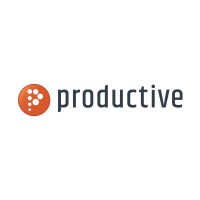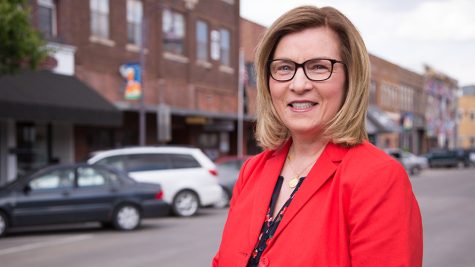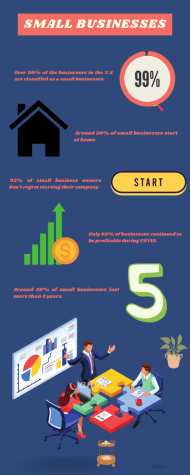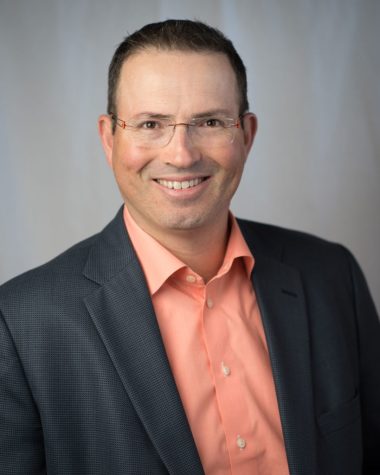Small Businesses after the shutdown
May 9, 2022
Zooming through the Shutdown
Todd O’Bert, is a small business owner for the company Productive Corporation. This company focuses on the IT security space. O’Bert has been working within the different corporations for over 28 years, with 21 of those years being with his own company. His mission through his company is to help IT departments that help schools, and businesses improve their overall security posture. For this work they sell them things such as endpoint security, firewalls and multi-factor authentication(MFA). Originally, O’Berts first company was more of a hardware company, but his most recent job centers around software and services. He feels that this most recent business has “evolved”. He felt that the growth of technology within the economy would open more of a value for tech companies. Before the pandemic, he mentioned that his company, being technology based, was already ahead of the economy because of their involvement in platforms such as zoom. He then mentioned that because of that, his company did not take as much of a hit during the pandemic. In fact, with the importance of technology, with everyone being home, there was more of an importance for IT as more technology was being used more than ever before. He then added that, because nobody could travel, stay in hotels, or go to restaurants, there was a lot of government money that helps businesses and PPP loans really helped out. They also passed certain things for airline hospitality and restaurants. During the pandemic, O’Bert noticed through his Minneapolis office that there were “a bunch”of retail businesses that were closed. O’Bert does most of his work without having to go to his office in Minneapolis. He said that their company prefers to do Zoom as they feel it’s more convenient, especially given the fact that their job centers around technology. It’s a platform that he said he has been using for a long time, as they originally started using it well before COVID. Being comfortable and accustomed to Zoom, really made his transition during COVID a lot smoother. He often emphasized that his company prefers meeting online, as it’s more convenient. Also as his job centers around IT, his IT customers usually prefer to meet online. In his explanation on helping customers online, he described that “99%” of the time they would rather do a demo or be remote. Overall, O’Bert, as long as many others, have seen the effects that some businesses took during the pandemic with many struggling, and others succeeding. For the most part the small businesses that succeeded were ones that had a strong online presence. Compared to larger companies such as Target, small businesses typically don’t have as much of an online presence which made it difficult to generate income. O’Berts case shows an example of someones business who didn’t suffer as much as others.

Professor Teaches
Dr Niehm is a professor at Iowa State University who teaches entrepreneurship. She has a PhD in retailing and merchandise management from Michigan State University. She also gained knowledge and experience through working with small business retail association at MSU and through her work as a leader of a small business consulting team at Iowa State dating back all the way to 2002. Overall, she has a great outlook and perspective on the different areas of small business, with more of an educational perspective rather than a small business owner perspective. In this segment, she shares/teaches important information relating to the topic of small businesses.

What are the basic steps to know that are important in starting a small business?
- Ask yourself the following: what is the business idea, what problem or need does it solve, who are you solving it for, and how big is the market/demand for your offerings by the designated target customer?
- How competitive is the market for what you want to offer? How many direct competitors and those that offer close substitutes? How will you be bigger, better or different than the competitors?
- What are your distinct competitive advantages/strengths over these competitors and what are your weaknesses?
- Do your homework—What is the state of the industry for your business? Are there other market factors that make this a good time (or not) to start this business?
- Do you have the skills needed to start this type of business and what are they? If not, who will you partner with to get the needed skill set?
- What kind if financial resources will it take to start and operate the proposed business? You will be expected to put at least 30% down of the start up costs.
- Where/how will you finance your business?
- Do you have the time, dedication, and drive to start your own business? What are the benefits vs. risks to be considered for you and your family.
- Once you have researched and answered these questions, you need to develop a formal business plan comprised of the following basic parts: feasibility analysis, financial analysis, marketing and sales plan.
- You will also need to consider the form of ownership (just you, partners, etc.) and file a Doing Business As form in your state/county.
How has COVID effected small businesses positively and negatively?
It depends on the industry sector (e.g. restaurants) and also the flexibility of the business owner and their ability to adapt and change. Small businesses that were able to pivot and find new and innovative ways to operate, get their products to customers, shift to online operations, etc. have tended to fair pretty well. Those who were not change oriented may not have survived. Many found new and more efficient ways to manage their businesses, new service and product categories, etc. that were a result of strategic pivots made during the pandemic. Also those that were in good financial shape and technology enabled prior to the pandemic also were better able to survive and thrive during and after the pandemic.
Are there any changes during the pandemic that are important to think about if planning to start a small business?
A key lesson to be learned is that even small businesses need to be multi-channel—meaning operating in more than one form/channel (e.g. physical store, online (website and social media), pop-ups, direct sales, mobile, other). Small businesses cannot do all channels, but they need to have multiple revenue streams (ways of making money) and operate/distribute through at least 2 channels. This provides a access to customers if another pandemic or crisis situation occurs in the future.
What is your background and how does it relate to small business entrepreneurship?
I have my PhD in retailing and merchandising management from Michigan State University with an emphasis in entrepreneurship and marketing. I worked with small businesses with the Michigan Retail Association while at MSU. I have taught entrepreneurship and retailing courses, conducted research related to small businesses, and led small business consulting teams at Iowa State University since 2002.
Why do you feel that promoting entrepreneurship is important?
I feel that students and really everyone needs to have options in life. If you have an entrepreneurial mindset and know how to identify opportunities and problem solve in innovative ways, you will always have options available to you—in your job and in life. Entrepreneurial thinking can be applied to starting a business as well as other aspects of life.

Day in the Life of a Small Business Owner
Bob Freytag is a small business owner for Introworks. Typically his day varies as most peoples do, so here’s a description of a day that he had on a Thursday in April. First, he was working from Florida because he was down there for a funeral (he typically works in Minneapolis) Because he’s used to working remotely, his wife came with him and made a week out of it. He figured that flying in Wednesday-Thursday was best as the weekends can be “crazy expensive” to fly. His Thursday started by joining his Minneapolis based networking group, PRO,pronetwork.biz, online. They are now doing hybrid meetings as most of them used to be in person. About 20% of their members were online. After that meeting, he started preparing for a major pitch they had that for OpSens at 9:30. They had team members from Minnesota, Wisconsin and Canada. While he had team members from Florida, Minnetonka, Braninerd, Minneapolis and Burnsville. He noted that it came together very well. Immediately following that, he had to pack up and leave for the Florida airport. During his drive to the airport, he was able to connect with a few people, including their banking and a prospect. He then got to the airport, and went through security, then immediately hopped online. There were a few legal papers he had to sign and respond to emails. From there, he jumped on the plane and started crafting his story for the bank he’s working with. He then landed where his son picked him up and brought him home, had dinner and responded to a few emails and prepared for his HispoSonics meeting the next morning(Friday) He then stated that Pre COVID, he would have flown in Thursday night, attended service on Friday, and returned over the weekend. Post COVID, he decided to do what he did instead because of the convenience of meeting online. He referred to this as a work from anywhere mentality.



